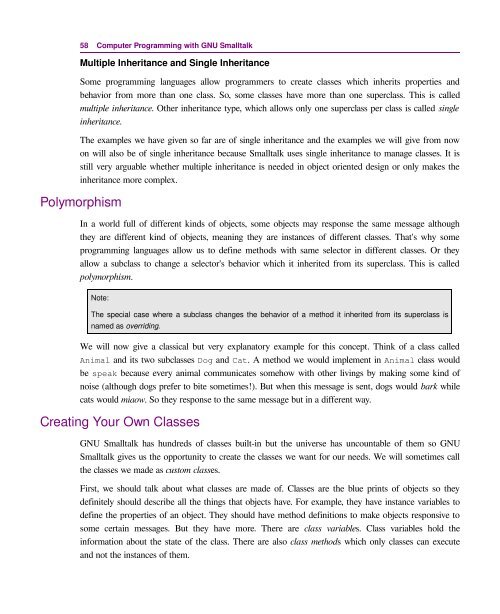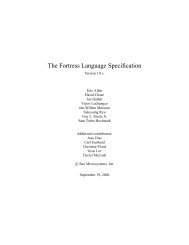Computer Programming with GNU Smalltalk - Free
Computer Programming with GNU Smalltalk - Free
Computer Programming with GNU Smalltalk - Free
You also want an ePaper? Increase the reach of your titles
YUMPU automatically turns print PDFs into web optimized ePapers that Google loves.
58 <strong>Computer</strong> <strong>Programming</strong> <strong>with</strong> <strong>GNU</strong> <strong>Smalltalk</strong><br />
Multiple Inheritance and Single Inheritance<br />
Some programming languages allow programmers to create classes which inherits properties and<br />
behavior from more than one class. So, some classes have more than one superclass. This is called<br />
multiple inheritance. Other inheritance type, which allows only one superclass per class is called single<br />
inheritance.<br />
The examples we have given so far are of single inheritance and the examples we will give from now<br />
on will also be of single inheritance because <strong>Smalltalk</strong> uses single inheritance to manage classes. It is<br />
still very arguable whether multiple inheritance is needed in object oriented design or only makes the<br />
inheritance more complex.<br />
Polymorphism<br />
In a world full of different kinds of objects, some objects may response the same message although<br />
they are different kind of objects, meaning they are instances of different classes. That's why some<br />
programming languages allow us to define methods <strong>with</strong> same selector in different classes. Or they<br />
allow a subclass to change a selector's behavior which it inherited from its superclass. This is called<br />
polymorphism.<br />
Note:<br />
The special case where a subclass changes the behavior of a method it inherited from its superclass is<br />
named as overriding.<br />
We will now give a classical but very explanatory example for this concept. Think of a class called<br />
Animal and its two subclasses Dog and Cat. A method we would implement in Animal class would<br />
be speak because every animal communicates somehow <strong>with</strong> other livings by making some kind of<br />
noise (although dogs prefer to bite sometimes!). But when this message is sent, dogs would bark while<br />
cats would miaow. So they response to the same message but in a different way.<br />
Creating Your Own Classes<br />
<strong>GNU</strong> <strong>Smalltalk</strong> has hundreds of classes built-in but the universe has uncountable of them so <strong>GNU</strong><br />
<strong>Smalltalk</strong> gives us the opportunity to create the classes we want for our needs. We will sometimes call<br />
the classes we made as custom classes.<br />
First, we should talk about what classes are made of. Classes are the blue prints of objects so they<br />
definitely should describe all the things that objects have. For example, they have instance variables to<br />
define the properties of an object. They should have method definitions to make objects responsive to<br />
some certain messages. But they have more. There are class variables. Class variables hold the<br />
information about the state of the class. There are also class methods which only classes can execute<br />
and not the instances of them.

















